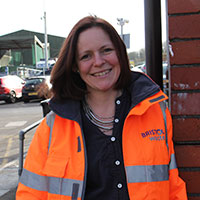This year Recycle Week runs from 21 to 27 September and is thanking the UK for continuing to recycle despite the challenges presented by the global COVID-19 pandemic.
To celebrate the organisations and individuals in the recycling sector who have continued to work hard despite the unprecedented difficulties encountered this year, during Recycle Week we are publishing a new industry insight Q&A every day with those who are really making a difference.
To kick things off, here is Gwen Frost, Head of innovation and sustainability at Bristol Waste Company, to tell us more about the challenges they have faced over the last six months.
Who are Bristol Waste Company and what do you do?
 Bristol Waste Company collect the recycling and waste in Bristol as well as undertake the street cleansing. Our aim is to make Bristol a cleaner and greener city to live and work in.
Bristol Waste Company collect the recycling and waste in Bristol as well as undertake the street cleansing. Our aim is to make Bristol a cleaner and greener city to live and work in.
I lead on bringing behaviour changes campaigns and new ways of working to the company and Bristol in terms of waste, such as #slimmywaste, #stopbindigestion, #wastenothing, #forcupssake, #dontbinyourbatteries and other change programmes, e.g. the development of new HRRC sites to the city, bringing sustainability issues up the agenda and supporting our hugely important Community Engagement and Marketing team.
For your organisation, what have been the biggest challenges in the last six months?
For us it’s been collecting the waste, alongside managing the operations and keeping everyone safe as we do that. We are well aware of the importance of waste as a key service, but we have been challenged in managing the volumes of waste coming in since lockdown started.
"It’s been insane, we are collecting Christmas amounts of waste every day."
Since April the general waste is up 12% - that’s 800 tonnes every month and that’s month on month, then add to that an increase of 25% dry recycling – paper, card, plastic and cans – which is really high in volume, an increase of 8% in food waste and an increase of 44% in glass – I suspect it’s not all jam and pickles!
Alongside that, it’s been a tough time to try and understand when residents are ready for a campaign on changing their behaviour, recycling and waste reduction. But if not now, when nothing is normal, when do we have these conversations – hence we stuck to our plans and launched our new #wastenothing challenge during the lockdown and our #stopbindigestion shortly after that.
We were hopeful that our residents who were now spending a lot of time at home, eating and cooking, were ready to manage their food waste with us. As we have no ‘normal’ now, is this the time to change to a new normal, again we are so used to hearing that, we need to act upon it.
Has the ‘new normal’ presented any unforeseen opportunities for you?
Who would have thought that we would be working from home so much, or as someone said, living at work!
"The current situation has reminded us all that when changes need to be made they can be made."
What we now need to do is to pass on positive behaviour with regards to resources and how we still care for them at home as we did in the business environment. We need to take this time to assess the use of resources and validate them wherever we are.
What does the future look like for your industry and what challenges lie ahead?
The future currently looks quite challenging, we are currently looking at increases in waste generation and resource usage that we have seen reduce over many years and in the matter of a few weeks those improvements were obliterated.
When we are so aware of our environments now, in the midst of a climate and ecological emergency, I see that we really need to focus on resource usage and how it impacts on our own environments, as they have become much smaller of late.
Although recycling levels have increased, so have residual waste levels, this is the concern, we need to manage that and critically understand what it is. We are now all generating our work waste at home.
What one piece of advice to improve recycling would you tell consumers today?
Only bring into your house items you know how to get out of your house – materials that can be reused at home or readily recycled from the kerbside – what cannot be processed in this way needs to be identified and minimised.
"We have all of a sudden become accepting of single use items again."
Are they necessary or are they just more accepted in society again - do we need a Blue Planet photo of a face mask?
And what advice would you give policy makers?
Similar to the above I suppose, keep items and materials easy to recycle – or be prepared to really invest in a collection infrastructure to collect the items, so many times we hear it’s down to the local collection infrastructure to collect these materials. It’s not the collectors responsibility – it’s the manufacturers responsibility as well – we are in this mess together.
Tell us your favourite fact or myth to bust about recycling
Every time we send a bale of coffee cups for recycling it’s 70,000 cups – although amazing, its only 1 in a 100 that are used in the UK every day!

Ben Luger
Marketing projects specialist
Ben joined the team at the beginning of 2015 and helps drive marketing communications and projects for Ecosurety, including project managing the launch of the Ecosurety Exploration Fund and website content development.

Latest News

Q2 2024 recycling data shows strong performance in H1
By Sam Marshall 24 Jul 2024
Ecosurety continue to step up for refill and reuse
By Victoria Baker 24 Jun 2024
Ecosurety renews B Corp™ certification with flying colours
By Louise Shellard 11 Jun 2024
Ecosurety sponsor the 2024 Carbon Literate Organisation Awards
By Louise Shellard 07 Jun 2024
